This document covers the following topics:
With the XML/SOAP Listener you can define parameters inside the payload of a message. We recommend this approach rather than HTTP parameters. Define the setting in the SOAP header and under the first tag of XML document as follows:
...
<soap-env:SOAPHeader>
<exx:EntireX xmlns:exx="urn:com.softwareag.entirex.xml.rt">
<!-tags with parameter setting e.g: -->
<exx-natural-library>libraryname</exx-natural-library>
<exx-natural-security>true</exx-natural-security>
</exx:EntireX>
...
</soap-env:SOAPHeader>
...
<root-tag>
<exx:EntireX xmlns:exx="urn:com.softwareag.entirex.xml.rt">
<!-tags with parameter setting e.g: -->
<exx-natural-library>libraryname</exx-natural-library>
<exx-natural-security>true</exx-natural-security>
</exx:EntireX>
...
</root-tag>
The library name sent with the RPC request to the EntireX RPC or the
Natural RPC Server is specified in the IDL file. See library-definition under Software AG IDL Grammar. When the RPC is executed, this
library name can be overwritten.
![]() To overwrite the library
To overwrite the library
An EntireX XML/SOAP Wrapper client (Java API) must call the
setLibraryName method.
![]() To force the library to be considered by
Natural RPC Servers
To force the library to be considered by
Natural RPC Servers
Call the setNaturalLogon method.
![]() To overwrite the library
To overwrite the library
Use the parameter exx-natural-library.
![]() To force the library to be considered by
Natural RPC Servers
To force the library to be considered by
Natural RPC Servers
Set the parameter exx-natural-security to
"true".
| Warning: Natural RPC Servers and EntireX RPC Servers behave differently regarding the library name. |
See also Natural Logon or Changing the Library Name under Common Features of Wrappers and RPC-based Components.
EntireX and Natural RPC support a feature called RPC compression to reduce network traffic. The default for compression is on. See also RPC Compression under Common Features of Wrappers and RPC-based Components.
![]() To switch compression on and off
To switch compression on and off
Use the setCompression method of the class
XMLRPCService inherited from class
RPCService.
![]() To check the current compression setting
To check the current compression setting
Use the getCompression method of the class
XMLRPCService inherited from class
RPCService.
![]() To switch compression on and off
To switch compression on and off
Use the parameter exx-compression. Possible
values: True, False.
It is assumed that you are familiar with the concepts of conversational and non-conversational RPC. See also Conversational RPC under Common Features of Wrappers and RPC-based Components.
For conversational RPC you need an instantiated conversation object.
See Conversation. Conversational RPC is enabled by passing a
reference to this object to the method
setConversation. See setConversation. Different stubs can participate in the same
conversation if they use the same instance of a Conversation object. An RPC
conversation is terminated by calling either the
closeConversation method or the
closeConversationCommit method for one stub.
![]() To enable conversational RPC
To enable conversational RPC
Create a Conversation object and set this with
setConversation on the wrapper object.
Different wrapper objects can participate in the same conversation if they use the same instance of a conversation object.
![]() To abort a conversational RPC communication
To abort a conversational RPC communication
Call the closeConversation method.
![]() To close and commit a conversational RPC communication
To close and commit a conversational RPC communication
Call the closeConversationCommit
method.
Conversations can only be used in connection with sessions. If the session is interrupted, the conversation will be deleted.
![]() To use conversational RPC
To use conversational RPC
Use the parameter exx-conv with the value
OPEN.
![]() To continue conversational RPC
To continue conversational RPC
Pick up the parameter exx-sessionID in
response and set the parameter as HTTP parameter or in the same way as in the
response document inside the request document.
![]() To abort a conversational RPC communication
To abort a conversational RPC communication
Use the parameter exx-conv with the value
BACKOUT.
![]() To close and commit a conversational RPC communication
To close and commit a conversational RPC communication
Use the parameter exx-conv with the value
COMMIT.
See also XML Tester for Conversational RPC.
| Warning: Natural RPC Servers and EntireX RPC Servers behave differently when ending an RPC conversation. |
See also Conversational RPC under Common Features of Wrappers and RPC-based Components.
A Natural RPC Server may run under Natural Security to protect RPC requests. See also Natural Security under Common Features of Wrappers and RPC-based Components.
![]() To authenticate an EntireX XML/SOAP Wrapper client (Java API)
against Natural Security
To authenticate an EntireX XML/SOAP Wrapper client (Java API)
against Natural Security
Specify a user ID and password in the logon method of class
Broker.
If different user IDs and/or passwords are used for EntireX Security
and Natural Security, use the methods
setRPCUserId or
setRPCPassword to set the user IDs and/or passwords
for Natural Security.
![]() To force an EntireX XML/SOAP Wrapper client (Java API) to log on
to a specific Natural library
To force an EntireX XML/SOAP Wrapper client (Java API) to log on
to a specific Natural library
Call the setLibraryName method.
Call the setNaturalLogon method.
See also Natural Logon or Changing the Library Name.
![]() To authenticate against Natural Security
To authenticate against Natural Security
Specify the parameters exx-userID and
exx-password.
If a different user ID or password is used for EntireX Security and
Natural Security, use the parameters exx-rpc-userID and
exx-rpc-password to set the user ID or password for
Natural Security.
![]() To force a logon to a specific Natural library
To force a logon to a specific Natural library
Use the parameter exx-natural-library.
Set the parameter exx-natural-security to
True.
See also Natural Logon or Changing the Library Name.
Java-based EntireX applications (including applications using classes generated by the Java Wrapper) may compress the messages sent to and received from the broker. There is a general way to enable compression using broker ID, and another way that depends on whether you use the XML/SOAP Wrapper or the XML/SOAP Listener.
You may append the keyword compresslevel with one of the
values below to the Broker ID.
localhost:1971?compresslevel=BEST_COMPRESSION
localhost?poolsize=4&compresslevel=9
Both examples set the compression level to 9.
Set the compression level with the method
setCompressionLevel() as an integer or a string
argument.
You can use the constants defined in class
java.util.zip.Deflater.
If the string
starts with Y, compression is switched on with level 6,
starts with N, compression is switched off (level 0).
Permitted values are the integers 0 - 9 and the corresponding strings:
| Compression | Level |
|---|---|
| BEST_COMPRESSION | 9 |
| BEST_SPEED | 1 |
| DEFAULT_COMPRESSION | 6 |
| DEFLATED | 8 |
| NO_COMPRESSION | 0 |
![]() To set the compression level
To set the compression level
Use the parameter exx-compressLevel. The
values are described in the section above (XML/SOAP Wrapper (Java API)).
Java-based EntireX applications that require security can use security offered by EntireX. The following approaches are possible:
EntireX Security, see Overview of EntireX Security for a general introduction
Broker Security, for your own security implementation. See Sample Security Exits for Broker Security.
Encryption. For encrypted transport we strongly recommend using the Secure Sockets Layer/Transport Layer Security protocol. See SSL/TLS and Certificates with EntireX.
![]() To use EntireX Security
To use EntireX Security
Use one of the supported methods of useEntireXSecurity() within class Broker. See also Overview of EntireX Security for additional prerequisites. The auto mode specifies that the Broker object uses EntireX Security as needed by the broker
kernel. If the broker kernel is set up with security, the Broker object uses EntireX Security. If the broker kernel is not
set up with EntireX Security, it is not used.
An example of EntireX Security can be found in the
Client.java source in the Java ACI examples. Set the
constant field SECURITY to true, support a
password to the logon method and compile the source.
![]() To use your own security implementation
To use your own security implementation
Implement the interface BrokerSecurity. This implementation must
have an accompanying security exit for the broker kernel. See Using Sample Security Exits for Broker Security for more information.
Call one of the methods of
setSecurity() with the security object similar to
useEntireXSecurity().
With the parameter exx-use-security (true, false) you can force the use of EntireX Security. See Using an External Configuration File in Administering the EntireX XML/SOAP Listener under
UNIX |
Windows.
For encrypted transport we strongly recommend using the Secure Sockets Layer/Transport Layer Security protocol. See SSL/TLS and Certificates with EntireX.
If the target server of your Web service has to be reached through a firewall, set and adjust to your needs the following properties:
-Dhttp.proxySet=true
-Dhttps.proxySet=true
-Dhttp.proxyHost=httpprox.mydomain.org
-Dhttps.proxyHost=sslprox.mydomain.org
-Dhttp.proxyPort=8080
-Dhttps.proxyPort=443
-Dhttp.nonProxyHosts=*mydomain.org|localhost
-Dhttps.nonProxyHosts=*mydomain.org|localhost
-Dhttp.proxyUser
-Dhttps.proxyUser
-Dhttp.proxyPassword
-Dhttps.proxyPassword
Add the proxy settings to the start script.
The XML/SOAP RPC Server uses basic authentication for a Web service
if the configuration contains the attribute
basicAuthentication block in <TargetServer>.
Basic
authentication is used for all calls associated with defined XMM files for the
<TargetServer>.
Basic authentication can be used with fixed credentials or credentials set from the client application:
If <TargetServer> contains attributes user and password, these settings are used for basic authentication.
Otherwise the client application must provide the credentials: Enable Natural logon and set RPC user ID and RPC password.
See Configuration File for the XML/SOAP RPC Server under UNIX | Windows.
The XML/SOAP Listener allows you to use the user credentials from the incoming request by means of Basic Authentication or
UsernameToken.
The same credentials are used for EntireX Broker authentication and (Natural) RPC Server authentication.
This means you need to make some settings for the EntireX Web service in Web Service Wizard and Configuration Editor.
Note:UsernameToken is part of WS-Security. See WS-Security UsernameToken Specification.
See also Example: Setting up an EntireX Client to Consume a Secured Web Service in the IDL Extractor for WSDL documentation.
The priority of credentials settings is as follows:
exx-userID, exx-password, exx-rpc-userID, exx-rpc-password (highest priority)
UsernameToken
Basic Authentication (lowest priority)
![]() To use the XML/SOAP Listener with Basic Authentication and
To use the XML/SOAP Listener with Basic Authentication and UsernameToken Authentication
Select an IDL file or XMM file.
Choose .
Disable check box Use Defaults.
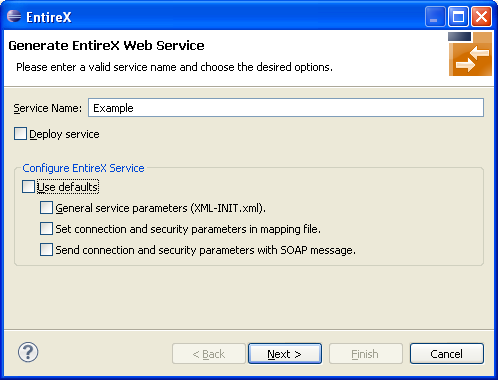
Enable at least General service parameters....
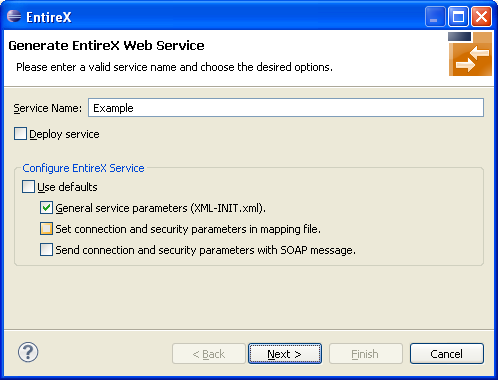
If using EntireX Security or Natural Security, enable Set connection and security... too.
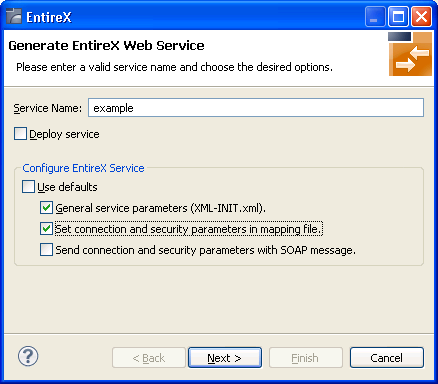
Press .
Enable the required authentication. In this example, both possibilities of web service authentication are enabled.
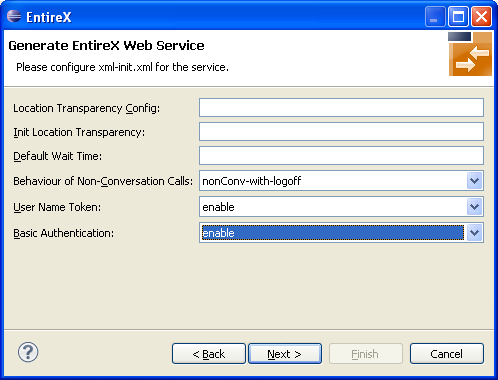
Press .
The page with XMM settings appears if it was selected before (step 5). Enable the required security (EntireX Security and/or Natural Logon).
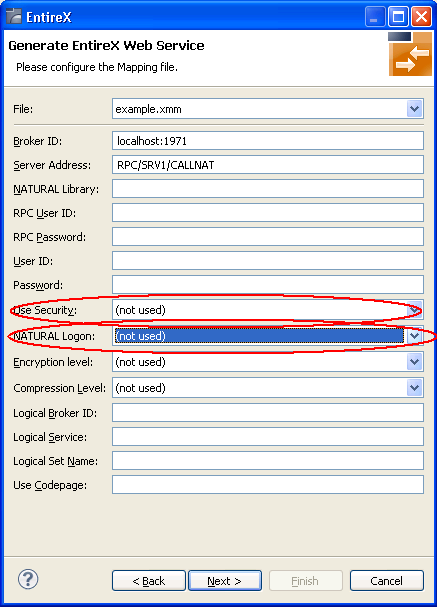
Press and follow the wizard.
After generating the web service archive (extension "aar"), open the generated AAR file with the Configuration Editor (e.g. with double click).
For more information on the Configuration Editor see Configuring Web Services.
Using HTTPS with XML/SOAP RPC Server requires setting Java properties and changing the protocol from http to https in the configuration file. This section covers the following topics:
See also Configuration File for the XML/SOAP RPC Server under UNIX | Windows.
![]() To configure SSL communication for the JRE
To configure SSL communication for the JRE
Set the following properties:
-Djavax.net.ssl.keyStore=<filename-without-blanks>
Here we keep the certificate and the private signing key of our
client application, which is the EntireX XML/SOAP RPC Server.
-Djavax.net.ssl.keyStorePassword=<you-should-know-it>
The password that protects the keystore.
-Djavax.net.ssl.keyStoreType=pkcs12
If not jks (default).
-Djavax.net.ssl.trustStore=<filename-without-blanks>
Here we keep the trusted certificate of the Web service host or
the certificate of its signing (issuing) certificate authority.
-Djavax.net.ssl.trustStorePassword=<you-should-know-it>
The password that protects the truststore.
-Djavax.net.ssl.trustStoreType=
If not jks (default).
For more information about Java and SSL, see your Java documentation (JSSE documentation).
set CLASSPATH=.;.\classes\entirex.jar;..\WS-Stack\lib\wsstack-client.jar set PROXYSETTINGS=-Dhttps.proxySet=true -Dhttps.proxyHost=sslproxy.mydomain -Dhttps.proxyPort=443 -Dhttp.nonProxyHosts="localhost" set SSL=-Djavax.net.ssl.keyStore=C:\myKeystore.p12 -Djavax.net.ssl.keyStorePassword=myKeystorePassword -Djavax.net.ssl.keyStoreType=pkcs12 -Djavax.net.ssl.trustStore=C:\myTrustStore.jks -Djavax.net.ssl.trustStorePassword=myTruststorePassword java -classpath %CLASSPATH% %SSL% %PROXYSETTING% com.softwareag.entirex.xml.rt.XMLRPCServer
For the changes that are required to the start script, see your Java documentation (JSSE documentation).
Specify the fully qualified host name as TargetServer. The host name has to match the CN (Common Name) item of the host certificate.
<?xml version="1.0" encoding="iso-8859-1" ?>
<EntireX
xmlns="http://namespaces.softwareag.com/entirex/xml/runtime/configuration" version="8.0"
>
<XmlRuntime Version="1">
<TargetServer name="https://targethost:8080/entirex/xmlrt">
<xmms>
<exx-xmm name="yourFile1.xmm" />
<exx-xmm name="yourFile2.xmm" />
</xmms>
</TargetServer>
</XmlRuntime>
</EntireX>
XML components support Conversion and Translation for Internationalization. If you choose Conversion (which is recommended), the correct codepage must be sent as locale string to the EntireX Broker matching the encoding of the data sent. This codepage must also be a codepage supported by the broker, see Locale String Mapping for information on how the broker derives the codepage from the locale string. For Translation and more details on Conversion, see Internationalization with EntireX.
To enable EntireX XML components to send a codepage as locale string to the EntireX Broker, they must be prepared as described below:
![]() To enable use of the encoding of an incoming XML document for
Broker communication
To enable use of the encoding of an incoming XML document for
Broker communication
Call useCodePage(true) on the
XMLRPCService object. The XML/SOAP Wrapper will then use the codepage retrieved from
the XML document to send data to EntireX Broker.
Use a stream-oriented method of
XMLRPCService to transfer the data to XML/SOAP Wrapper.
![]() To enable use of the encoding of an incoming XML document for
broker communication
To enable use of the encoding of an incoming XML document for
broker communication
Activate the parameter exx-use-codepage
(true/false). The XML/SOAP Wrapper will then use the codepage retrieved from
the incoming XML document to send data to the EntireX Broker.
The encoding for broker communication is defined by the parameter
codepage.
The locale string for broker communication can be overridden for a broker version 7.2.x and above. Instead of using the default encoding of the JVM, the given encoding is used.
It can be forced for a broker version 7.1.x and below.
It does not change the default encoding of your Java virtual machine.
We recommend using UTF-8 as the file encoding for your JVM and the
value LOCAL to send the default encoding of the JVM to the broker, i.e start
the XML/SOAP RPC Server with -Dcodepage=LOCAL and
-Dfile.encoding=utf-8. See also
Using the Abstract Codepage Name LOCAL for more information.
The encoding for the outgoing XML document is determined by the IDL to XML Mapping. See Defining the XML Encoding.
This section covers the following topics:
The EntireX XML/SOAP Runtime introduced a feature called null value suppression to reduce to amount of data transferred between Web client and Web service. Null value suppression (NVS) allows you to hide tags or attributes with a specified value (so-called null value).
The different types of NVS are explained below. The EntireX XML Mapping Editor provides two ways of setting/modifying the NVS type:
using a general setting on tab Mapping Parameter
on each element or attribute in the definition of request/response on tab XML Request/ XML Response
For several data types, a null value is defined by default. See Default Definition of Null Value. To change one of these null values, open the XML Request/XML Response tab, select the element/attribute and modify the property of the null value manually. For this modification use the Properties view or the Properties dialog (open with the context menu).
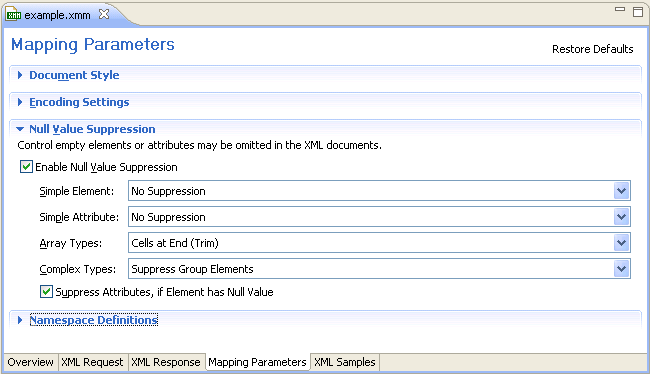
| Data Type | Suppression Mode |
|---|---|
| Simple Elements | No Suppression |
| Simple Attributes | No Suppression |
| Array Types | Cells at end (trim) |
| Complex Types | Suppress group elements |
Tip:
The default setting for elements and attributes changed with version
7.3 from "Suppress Element/Attribute" to
"No Suppression". The null value suppression for
elements and attributes can be set independently. The null value suppression
for Complex Types was introduced with version 7.3.
If there is a significant difference between pure XML and SOAP for a null value suppression mode, two examples are introduced.
| Suppression Mode | Valid for |
|---|---|
| No Suppression | Elements, attributes |
| Elements | Elements |
| Attributes | Attributes |
| Cells at End (Trim) | Elements inside an array definition |
| All Empty Cells | Elements inside an array definition |
| Suppress Group Elements | Elements inside a group definition |
| Depends On Element | Attributes |
The element or attribute is always present in document. The minimum and maximum occurrence of element/attribute must be set to one.
| XML document | Displayed XML Document |
|---|---|
<prog> <integer>0</integer> </prog> |
<prog> <integer>0</integer> </prog> |
An element is hidden if
the element value is equal to null value
all attributes of the element can be suppressed
the element has only subelements that can be suppressed
The minimum occurrence of element must be zero, and the maximum occurrence of element must be one.
| XML document | Displayed XML Document |
|---|---|
<prog>
<gr>
<integer>0</integer>
</gr>
</prog> |
<prog /> |
An attribute with null value is hidden.
The minimum occurrence of attribute must be zero, and the maximum occurrence of attribute must be one.
| XML document | Displayed XML Document |
|---|---|
<prog integer="0" name="Henry"/> |
<prog name="Henry"/> |
All elements of array that fulfills the assertion of "Suppress Element/Attribute" are suppressed if its index is higher than the highest index of the non-suppressed element.
The minimum occurrence of elements must be lower than the maximum occurrence, and the maximum occurrence of elements must be the maximum number of elements or unlimited.
| XML document | Displayed XML Document |
|---|---|
<prog>
<array>
<integer>0</integer>
<integer>1</integer>
<integer>0</integer>
<integer>2</integer>
<integer>0</integer>
<integer>0</integer>
</array>
</prog> |
<prog>
<array>
<integer>0</integer>
<integer>1</integer>
<integer>0</integer>
<integer>2</integer>
</array>
</prog> |
All elements of array that fulfills the assertion of NVS_FIELD are suppressed.
The minimum occurrence of elements must be lower than the maximum of occurrence and maximum occurrence of elements must be maximum number of elements or unlimited.
| XML document | Displayed XML Document |
|---|---|
<prog>
<array>
<integer>0</integer>
<integer>1</integer>
<integer>0</integer>
<integer>2</integer>
<integer>0</integer>
<integer>0</integer>
</array>
</prog> |
<prog>
<array>
<integer>1</integer>
<integer>2</integer>
</array>
</prog> |
| SOAP document | Displayed SOAP Document |
|---|---|
<prog>
<array>
<integer>0</integer>
<integer>1</integer>
<integer>0</integer>
<integer>2</integer>
<integer>0</integer>
<integer>0</integer>
</array>
</prog> |
<prog>
<array>
<integer SOAP-ENC:position="[1]">1</integer>
<integer SOAP-ENC:position="[3]">2</integer>
</array>
</prog> |
The suppression mode allows you to suppress group information if - and only if - all elements of the group can be suppressed.
The minimum occurrence of elements must be zero.
| XML document | Displayed XML Document |
|---|---|
<prog>
<person>
<firstname>Henry</ firstname >
<lastname>Miller</ lastname >
<someInformation>2</ someInformation >
</person>
<person>
<firstname></ firstname >
<lastname></ lastname >
<someInformation>0</ someInformation >
</person>
<person>
<firstname>John</ firstname >
<lastname>Miles</ lastname >
<someInformation>0</ someInformation >
</person>
</prog> |
<prog>
<person>
<firstname>Henry</ firstname >
<lastname>Miller</ lastname >
<someInformation>2</ someInformation >
</person>
<person/>
<person>
<firstname>John</ firstname >
<lastname>Miles</ lastname >
<someInformation>0</ someInformation >
</person>
</prog> |
Attribute of the element is visible if the element does not have the null value.
The minimum occurrence of attribute and associated element must be zero, and the maximum occurrence must be one.
| XML document | Displayed XML Document |
|---|---|
<prog type="integer">0 <parm type="integer">0</parm> </prog> |
<prog /> |
| Data Types | Null Value |
|---|---|
| String | Empty String |
| Integer | 0 |
| Floating Point | 0.0 |
| Numeric | 0.0 |
| Time | No default definition |
| Date | No default definition |
| Binary | No default definition |
| Boolean | False |
For further settings, use the method
setUserProperty in
XMLRPCService (EntireX XML/SOAP Runtime).
The XML/SOAP RPC Server maps the values of IDL parameters to XML/SOAP documents and vice versa. If the Web service responds with a fault document, this information is mapped to an error and returned to RPC client normally. With the optional feature Map Fault to IDL Parameter you can map values from a normal response and also from a fault document response. This means that no RPC error is returned to the RPC client; instead the fault information is contained in the IDL file. An RPC error is returned to the client only if internal error processing problems occurred within the XML/SOAP RPC Server. This feature is available for SOAP and XML documents.
Note:
This example illustrates the feature Map Fault to IDL
Parameter. Other features mentioned here, such as renaming
parameters or assigning a prefix/namespace to a parameter, are described
elsewhere.
/* Sample IDL file
library 'Demo' is
program 'FaultToIDL' is
define data parameter
1 MyRequest In
2 RequestData (AV)
1 MyResponse Out
2 ResponseData (AV)
1 MyStatus Out ** parameters for fault information
2 Code (AV)
2 String (AV)
2 Detail (AV)
end-define
![]() To map fault items to IDL
To map fault items to IDL
In the XML Mapping Editor, generate a (SOAP) mapping and select the response tab.
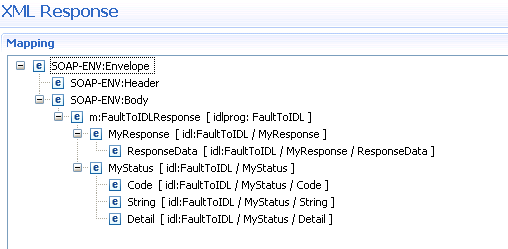
Remove the parameter MyStatus, including
its children, because the regular response will not contain these parameters
and the corresponding IDL parameters will be used for fault information
later.
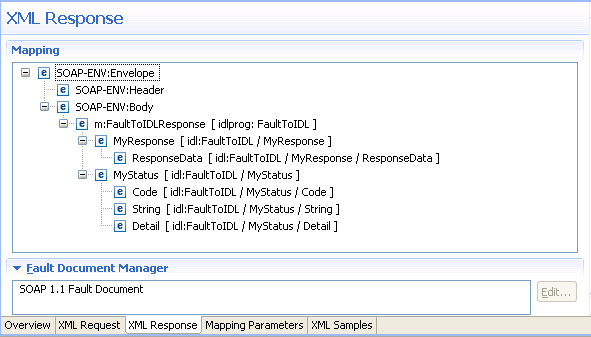
Open the Fault Document Manager (see bottom of opened tab Response) and select the document to open the following wizard:
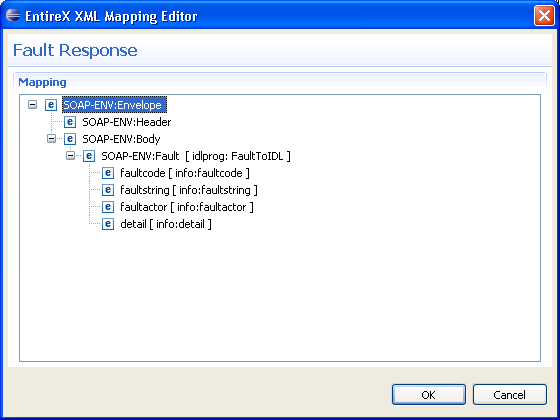
In the following steps, map "faultcode", "faultstring" and "detail" to IDL parameters. Fault item "faultactor" is not used in this example.
Select "faultcode" and open the properties shown on the following screen:
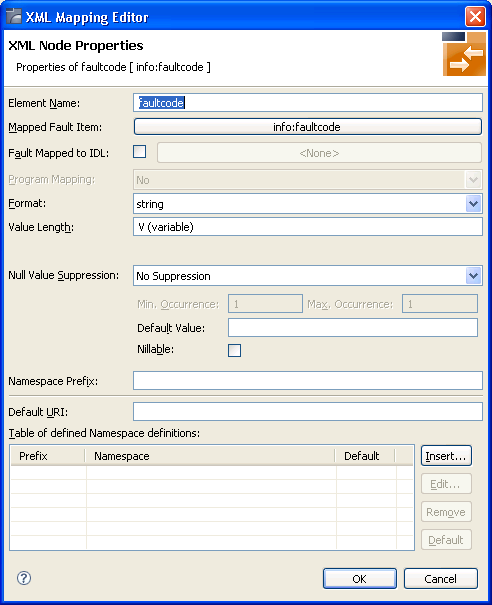
Check Fault Mapped to IDL to enable the mapping path button. In this example, a mapping path has not yet been entered and the button is labelled "<none>".
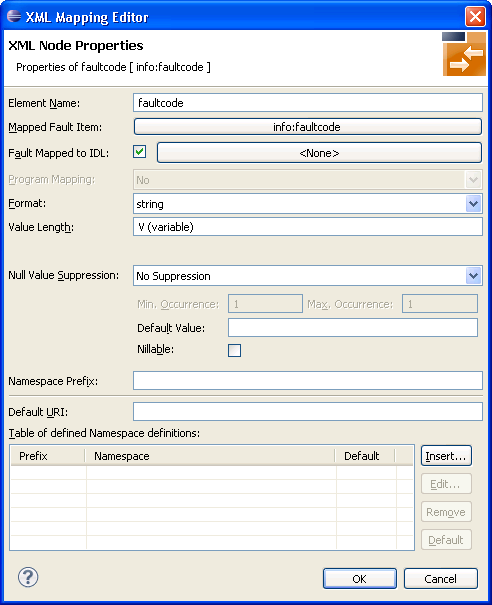
Press the mapping path button.
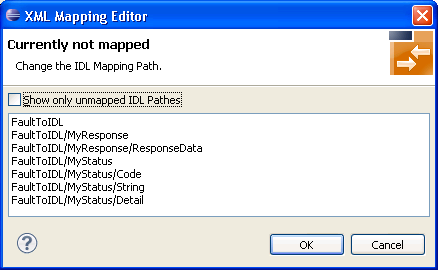
Select the path to IDL parameter, for example "FaultToIDL/MyStatus/Code" and choose to display the following screen:
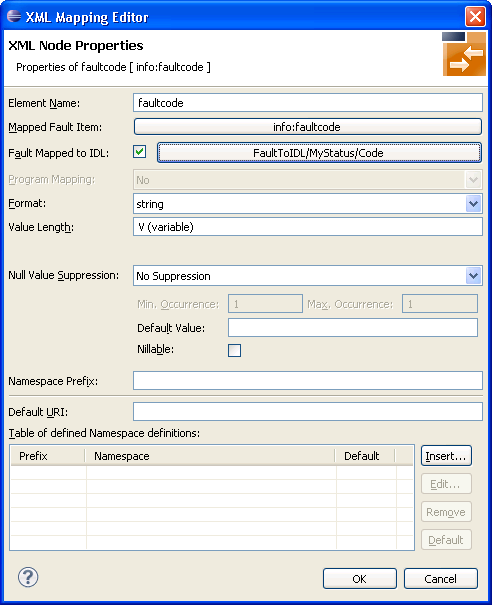
Choose .
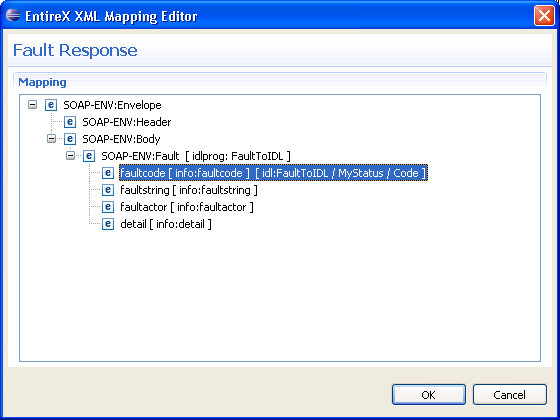
Repeat the steps above to select the fault items "faultstring" (path to IDL parameter e.g. "FaultToIDL /MyStatus/String") and "detail" (path to IDL parameter e.g. "FaultToIDL /MyStatus/Detail").
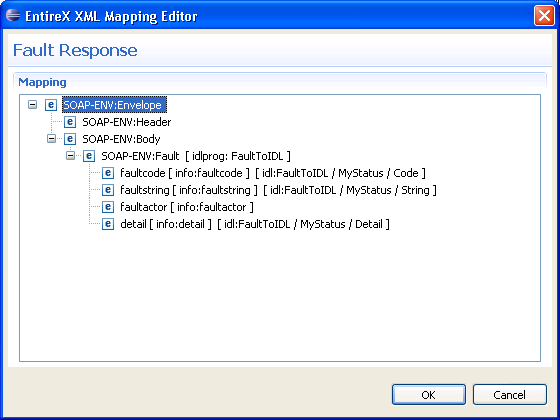
Note:
The fault item "info:detail"
contains the complete document fragment enclosed by an associated tag (in this
example tag <detail>).
Choose to save the IDL-XML mapping.
In subsequent steps you need to
Set up the XML/SOAP RPC Server with this XMM.
Set up a new Web service or use an existing one.
As a quick test, implement a Web service that behaves as follows:
If the "requestData" field contains any data except "throwException", the field "responseData" in the response document is set to a concatenation of the string "Receiving:" and the value of field "requestData". See Request 2).
If the "requestData" field contains "throwException", the Web service responds with a SOAP fault.
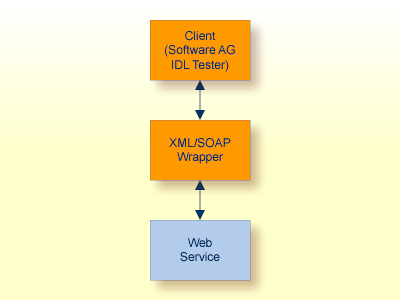
The following screen illustrates a request that expects a normal response:
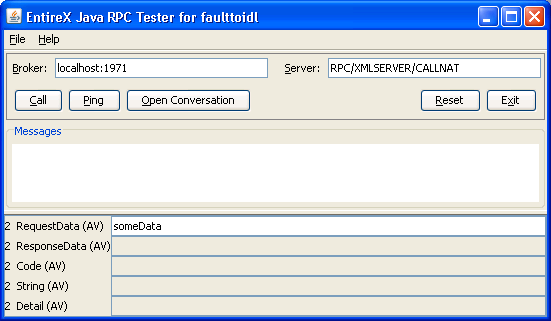
The following response is received (field responseData is filled):
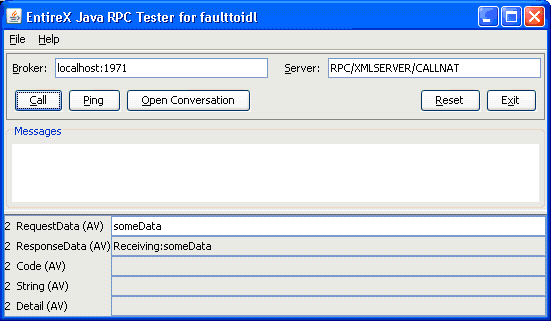
The following screen illustrates a request where a fault document from the Web service is expected:
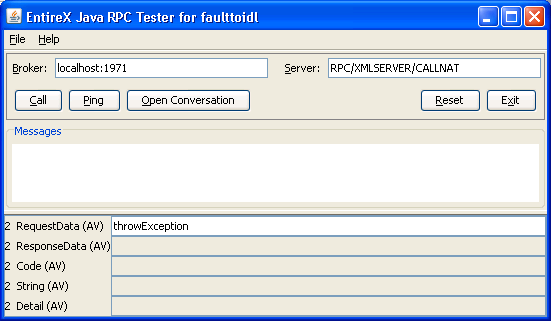
The following fault information is provided:
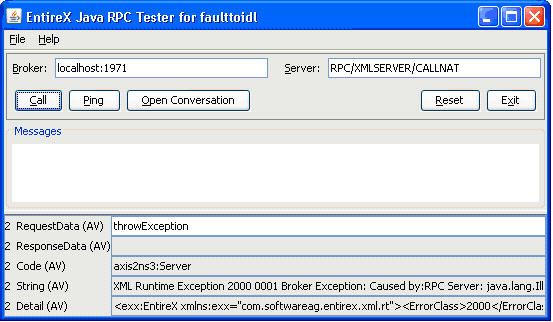
xml:space (see XML specification) on element(s). The attribute xml:space has the higher priority and is inherited from children of the element recursively.
This section covers the following topics:
The attribute xml:space can be added in the XML Mapping Editor. Select an element and add new child, select the checkbox for xml:space and choose
. Depending on the application, perform these steps for the request and/or response document definition. The attribute is
added with value "preserve". If another value is required, open the properties on the attribute and change the default value.
Note:
The XML/SOAP Runtime only supports the value "preserve" for attribute xml:space, all other values disable the preserving of whitespace (that is, whitespace is trimmed).
The steps required to keep whitespace as default depend on the EntireX component:
XML/SOAP Listener
Add the following line to file axis2.xml in WS-Stack Web application:
<parameter name="exx-xml-space">preserve</parameter>
Java API (XMLRPCService)
Set the user property entirex.sdk.xml.runtime.xmlspace:
XMLRPCService rpcService = new XMLRPCService(...);
...
rpcService.setUserProperty("entirex.sdk.xml.runtime.xmlspace","preserve");
XML/SOAP RPC Server
Add the following line to properties file of the XML/SOAP RPC Server:
entirex.sdk.xml.runtime.xmlspace=preserve